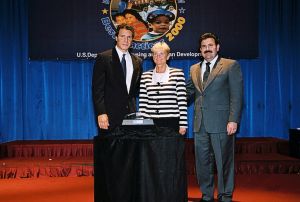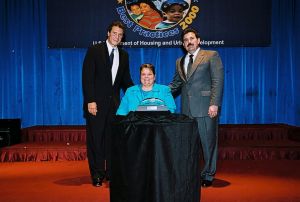 |
2000 Best Practice Awards
Best of the Best Winners: Iowa
Best Practice: Polk County, Iowa, Housing
Trust Fund
IOWA HOUSING TRUST FUND FILLS GAPS IN AFFORDABLE
HOUSING
Polk County, Iowa. Iowa nonprofits now have a unified source of funding, capacity
building and operational support to develop affordable housing projects—the
Polk County Iowa Housing Trust Fund. Freed from ongoing fundraising and
administrative constraints, developers have built more than 838 affordable
housing units through financing from the fund since the trust’s inception.
The trust supports six programs:
- Supportive Services—helps stabilize
families through activities such as housing counseling and case management.
- Operating Expenses—provides a mechanism
to stabilize the operations of the nonprofits that partner with the trust
by covering staff salaries, office space and janitorial services.
- Capacity Building—provides financing
to help nonprofits expand operations, develop new services, strengthen
partnerships and support staff training.
- Development—provides grants or loans
to fund acquisition, rehabilitation and new construction
of owner-occupied and rental housing.
- Predevelopment—provides financing at
early project stages for purchasing property, market analysis, legal fees
and loan application fees.
- Technical Assistance—helps neighborhoods
complete comprehensive housing need assessments and pursue tailor-made
housing projects.
The Neighborhood Finance Corporation, a nonprofit
mortgage banker, currently administers the trust, which is in the process
of obtaining 501 (c) 3 status. All funds must be used for units that assist
low-income families, and half of the funds must help very low-income families.
The trust allows money to be pooled to finance projects of vital importance
to the community. Innovation is encouraged and activities funded by the
trust must be unavailable from any other source. The trust evaluates grantee
progress on behalf of corporate sponsors that contribute to the fund.
Formed by seven nonprofit housing providers,
the trust enjoys support from multiple public and private
partners. A HUD Special Purpose grant for $2 million to launch the program
helped leverage private funding of nearly $1 million. Polk County contributed
$3 million, the city of Des Moines provided HOME and CDBG funding of $1.5
million and the state’s housing funds contributed $870,000.
The trust fund idea emerged during an area
need assessment conducted in the early 1990s by a coalition of business,
nonprofit and government representatives called Community Focus. While the
need was evident, realization took years. Diverse interest groups vied to
direct the trust’s focus and structure. At times, prominent supporters
moved or changed jobs. The coalition held focus groups, one-on-one meetings
with key stakeholders and facilitated joint development of a business plan
to help these groups reach consensus.
The trust next addressed how to coordinate
financial distribution and activities under one umbrella. The county agreed
to dedicate its funds to administrative overhead. Corporations supporting
the trust and nonprofit housing developers receiving trust financing each
made concessions to ensure effective collabo-ration. While corporations
have the option to target their contributions to certain activities, they
agree to relinquish control to trust staff. Nonprofit members agree they
will not solicit funds separate from the trust, thus allowing supporters
to contribute to a single entity.
By creating programs that respond to identified
community needs, the trust allows developers the flexibility and funding
to operate their programs effectively.
Contact: Jayne Jochem, Phone: (515) 883-2509
Tracking Number: 512
Winning Category: Program (Community Planning and Development)
Best Practice: Building Blocks for a Better Tomorrow Through the Community
Housing Development Corporation
COMMUNITY HOUSING DEVELOPMENT CORPORATION
BUILDS LOW INCOME HOUSING
Des Moines, Iowa. The Community Housing Development Corporation (CHDC) in Des
Moines, Iowa, provided low-income families with the opportunity of homeownership
by constructing and rehabilitating 50 single-family homes in the Des
Moines Enterprise Community. CDHC also provided construction training for
its workers and offers an affordable rehabilitation program for low-income
owners. These programs benefit the entire community by reversing blight
and deterioration.
CHDC’s mission is to provide safe, decent,
affordable homeownership opportunities for families with incomes below 80
percent of |

Carol Bower (c) receiving Best of the Best
award from Secretary Cuomo (l) and Deputy Secretary Ramirez (r) |
the area median income. Currently, CHDC completes
in excess of $1.2 million of construction annually and an additional
$50,000 in owner-occupied repair services. Job trainees are used on both
new construction and rehabilitation of single-family homes.
CHDC works exclusively in the Enterprise Community
through its Building Blocks program and other efforts. The Building Blocks
program concentrates on the revitalization of neighborhoods near city schools
in the Enterprise Community. Existing older homes are rehabilitated for
sale, and new construction is built as in-fill. When 26 homes were revitalized
around an inner-city elementary school, the school superintendent indicated
that rehabilitating the school or constructing a new school on the site
is now an option based on the positive changes in the neighborhood.
CHDC always includes job training in its programs.
The job training apprentice program currently employs 17 individuals, including
Vietnamese, Haitian, Bosnian, African-American, Hispanic and Caucasian trainees.
As a growing need for job training for non-English-speaking individuals
became apparent, a bilingual program was developed with instructors fluent
in Spanish, Vietnamese and Bosnian. Under this new program, unemployed and
under-employed persons who have very little or no English have an opportunity
to learn skills that will potentially increase their income, while at the
same time learning English.
CHDC provides repair services to low-income
homeowners. Fees are based on the ability of the owner to pay. Several owners
have chosen to participate in a sweat-equity arrangement.
CHDC is also developing a “Senior Campus”
to respond to the documented need in the Enterprise Community for low-income
senior housing with supportive services. Thirty percent of Des Moines’
elderly persons over the age of 65 live in the Enterprise Community, with
50 percent of those qualifying as low income.
CHDC attributes its success to securing half
of its funding from private sources and to its construction job training
program. To be successful too, other communities should take the following
four steps:
- Partner with a community-based organization
with a mission of improving affordable housing
- Identify homeownership and neighborhood
revitalization as goals
- Conduct a needs assessment in the targeted
neighborhood
- Secure financing from several sources. In
addition to private donations and homebuyers’ contributions, an organization
should be tied into the CDBG and HOME process in order to receive that
funding.
Contact: Carol Bower, Phone: (515) 244-7798
Tracking Number: 551
Winning Category: Geographic |
Best Practice: Stay N Play Child Care Center
PUBLIC HOUSING FAMILIES BENEFIT FROM STAY
N PLAY CHILD CARE CENTER
Clinton, Iowa. The Clinton, Iowa, Public Housing Authority (PHA), with the
assistance of HUD and a number of local and state partners, created
a child care center and learning center to meet the needs of low-income
families in the community. Clinton PHA’s Stay N Play Child Care Center
provides quality child care services at an affordable rate to enable Section
8 and Public Housing parents to establish and maintain a better quality
of life for their families. The child care center’s current enrollment
is 114 children, and the center is at capacity with waiting lists for all
programs.
The Clinton PHA staff recognized that in order
for families to be self-sufficient, they must have available the support
of quality child care as well as access to opportunities for skill development
that is convenient for their schedules.
In addition, a Family Investment Center provides
a convenient meeting place for residents to attend evening and weekend workshops
while child care is provided in the adjoining Stay N Play center. Workshops
are offered on a regular basis to all public housing residents on a variety
of goal-related subjects, such as financial management, employment processes,
life coping skills, self-esteem, career development, homebuying, job seeking,
resume, interviewing skills and parenting. A computer lab provides a well-equipped,
quiet, convenient place for residents to complete school assignments, create
resumes, construct personal budgets or simply explore computer software
without having to find child care while attending the lab.
Through partnerships, the housing authority staff accessed child care subsidy,
food subsidy, local training opportunities, job training and private contributions.
The result is a child care center that is meeting the needs of residents
while operating with some profit, as well as a learning center that has
high usage.
The Clinton PHA primarily used HUD funding
for construction but has been innovative in the use of state and federal
subsidies and services for the operation and programming at the center.
To develop successful child care and learning centers, Clinton PHA staff
suggest the following steps:
- Identify the needs in the community
- Form partnerships with outside organizations
that share your goals
- Develop a business plan
- Identify funding sources
- Foster community support
Contact: Debra Vath, Phone: (319) 243-1289
Tracking Number: 511
Winning Category: Geographic and Program (Public and Indian Housing)
Best Practice: NHS Homeownership Mobile Unit
Neighborhood Housing Services Opens Mobile
Field Office
Iowa-Various Rural Areas. After government downsizing caused the closing of
more than 20 USDA Rural Development Field Offices in Iowa, a number of communities
suddenly found themselves cut off from their connection to housing services,
counseling and information. Recognizing this gap in coverage, Neighborhood
Housing Services (NHS), a nonprofit agency based in central Iowa, developed
a simple and logical solution. The group acquired a 35-foot recreational
vehicle and created a field office on wheels.
The mobile field office operates as a local
point of contact, resource center and |

Kathleen Moretz (c) receiving Best of the
Best award from Secretary Cuomo (l) and Deputy Secretary Ramirez (r) |
outreach hub for rural communities in southern
Iowa lacking access to information on fair housing, homeownership and housing
assistance resources. The mobile home enables interagency teams to visit
rural areas periodically and is equipped to receive satellite broadcasts
from the NHS home office, as well as broadcasts from HUD head-quarters.
The mobile field office allows rural communities immediate access to training
materials and HUD broadcasts, such as speeches by Secretary Cuomo. Training
sessions can be conducted by setting up chairs around the front of the recreational
vehicle, and necessary retrofitting and accommodations have enabled the
Winnebago to accommodate people with disabilities.
Beneficiaries of this program are under-served
rural communities and populations, including many major immigrant groups,
across southern Iowa.
Although the solution is highly nontraditional,
the planning, development and funding was rather straight-forward. The nonprofit
Neighborhood Housing Service approached the state USDA/Rural Development
office with the plan for a mobile unit to replace the closed field offices.
Planning sessions were held, and funding possibilities were discussed for
the acquisition and retrofitting of the mobile field unit. Ultimately, the
project secured commitments from USDA/Rural Services to provide financial
assistance, and from NHS to do the hands-on work needed to operate the unit
and perform the outreach.
The mobile unit is tangible evidence of high-level
cooperation between the nonprofit sector and a major federal agency, USDA/Rural
Development. USDA funded the project with a customized mix of grants and
loans, and Neighborhood Housing Services will service, staff and operate
the mobile field office with funds from other sources. The project creatively
addresses two issues: (1) The closure of more than 20 USDA/Rural Development
field offices in Iowa, while needs remain to be met; and (2) The growth
of under-served populations including expanding immigrant groups.
The mobile home, because of its mobility and
the imaginative retrofit, has the capacity to serve nearly all of the
20 communities that recently lost services using the costs associated with
only this one unique office and one staff.
Contact: Kathleen Moretz, Phone: (515) 277-6647
Tracking Number: 222
Winning Category: Program (Community Builder) |
Return to Best
Practices 2000 Best of the Best Winners
Content Archived: April 20, 2011 |